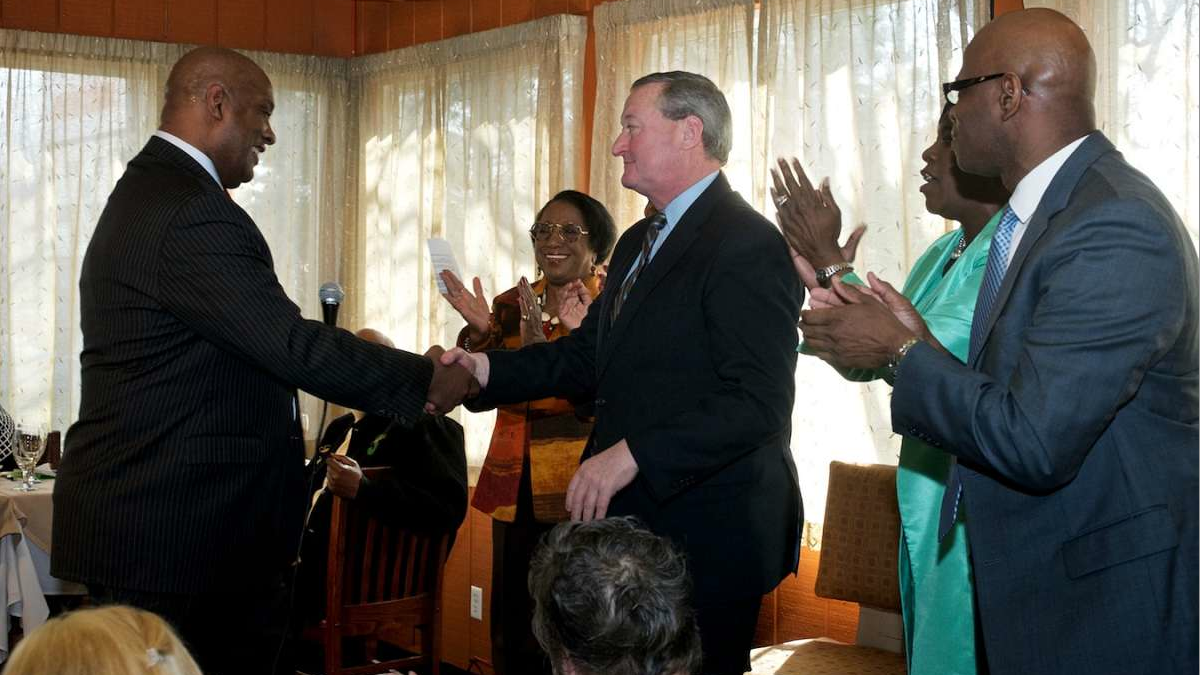Did Kenney actually win the black vote?
Listen
State Rep. Dwight Evans, who ran for mayor eight years ago, shakes Jim Kenney's hand at an April 6 endorsement event in West Oak Lane. (Bastiaan Slabbers/for NewsWorks)
One of the most striking things about former Philadelphia City Councilman Jim Kenney’s landslide win over state Sen. Anthony Williams in Tuesday’s Democratic mayoral primary is the support that Kenney, an Irish-American from South Philadelphia, got from African-American voters.
Could he have actually won the African-American vote? Maybe.
Since we vote by secret ballot and people live in racially mixed neighborhoods, there’s no way to get an exact count of black and white votes for anybody. So we estimate.
My crude method was to tally the unofficial returns of 19 of the city’s most homogeneously African-American wards, and I found Kenney with 787 more votes than Williams. It worked out to 43.5 percent for Kenney, 42.2 percent for Williams. (You can check my calculations here if you like.)
Neither candidate got a majority, but Kenney led all six candidates in those wards. The numbers will change some as official returns come in, and you could argue that my estimate actually underestimates the extent of racial crossover voting, since I don’t include racially mixed wards.
In any case, something pretty remarkable was happening in this mayoral primary.
A different kind of election
Focusing on racial voting always makes me a little uncomfortable. We should judge candidates on their merits and trust voters to make sound choices. But racial math is always a big part of political strategy in municipal elections, so it’s part of the story.
The first sign that something different was brewing in this mayor’s race came in April, when five African-American elected officials in Northwest Philadelphia endorsed Kenney for mayor.
That prompted a retort from some black leaders supporting Williams. One, attorney George Burrell, said some of the city’s early African-American political leaders would be turning over in their graves to see black leaders endorsing Kenney.
One of those who backed Kenney, state Rep. Cherelle Parker told me at polling place Tuesday that the criticism of Burrell and company inspired her and others to make sure they turned out a vote for their candidate.
“I think members of the community were insulted by the idea that anyone would think that they were automatically entitled to their votes, just because,” Parker said. “And Jim Kenney sort of used that as an opportunity to say ‘I’m here to earn your vote.'”
That polling place was in the 50th Ward in East Mt. Airy. When the returns came in, Kenney had beaten Williams in that ward by a two-to-one margin.
Dorothy Coleman, an elderly African-American woman from the neighborhood, told me she voted for Kenney in part on the recommendation of Parker and City Councilwoman Marian Tasco.
“I didn’t know much about him, but they gave me a lot of information before the election,” Coleman said. “Tasco said she sat beside him for 23 years, and I take her word for it.”
The overall results stunned the city’s political community. While his backers hoped Kenney would get a respectable slice of the black vote — maybe better than the estimated 15-20 percent Ed Rendell won in 1991, no one expected him to win black wards outright. My analysis of unofficial returns shows Kenney won nine out of 19 predominantly black wards in the city. Williams ran strongest in his state Senate district.
Neil Oxman is a veteran political consultant who worked for the city’s first black mayor, Wilson Goode, and its current one, Michael Nutter. He says Kenney’s strong showing among black voters is significant, and builds on the trend of crossover racial voting that emerged in 2007, when many white voters supported Nutter.
“I think the city is past the situation we were in in the ’60s, ’70s and ’80s, where you had a really polarizing figure like Frank Rizzo, where there had never been an African-American elected mayor, and where the African-American community felt a gigantic stake in making sure they were represented,” he said.
Oxman, who made ads for a super PAC supporting Kenney in this race, says many African-American voters felt free to choose the candidate that seemed best prepared; for many, it was Kenney.
Burrell, the attorney and former mayoral candidate who objected to Parker and Tasco endorsing Kenney, has a different take on the result. He said black voters who’ve elected three African-American mayors aren’t satisfied with what they’ve gotten.
“I think there’s a frustration, particularly in poor communities, in the black community and Hispanic community,” Burrell said. “I think people have said, `We’ve done this for a long time, and we haven’t gotten the change that we’re looking for.'”
Sharmain Matlock-Turner, president of the Urban Affairs Coalition, agrees black voters feel less compelled to vote for an African-American than they did years ago, and she thinks one reason Kenney did well has nothing to do with race.
Matlock-Turner said members of Congress or the state legislature — such as Willliams — have a harder time appealing to voters in a mayoral election than city officials like Kenney, who served 23 years on City Council.
“It gives them an advantage where they’re running in the city, where they have to talk about issues that people in the community have been hearing them talk about for a long period of time,” she said.
One thing all agree on: Kenney faces a challenge in meeting the hopes and aspirations of those who supported him.
WHYY is your source for fact-based, in-depth journalism and information. As a nonprofit organization, we rely on financial support from readers like you. Please give today.


